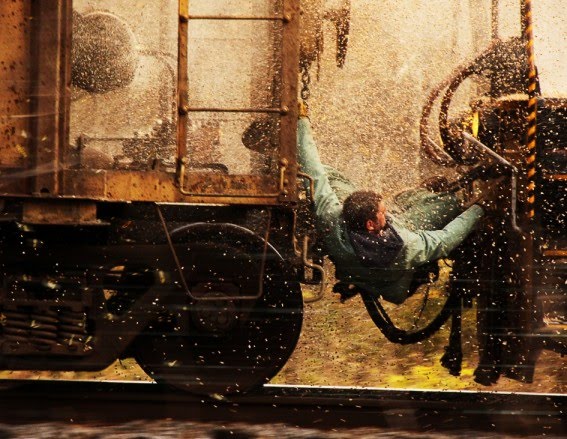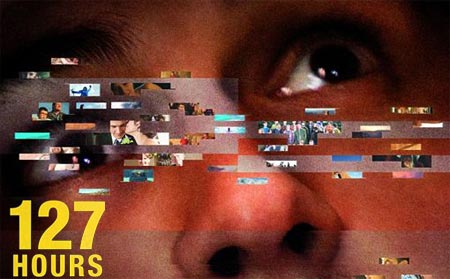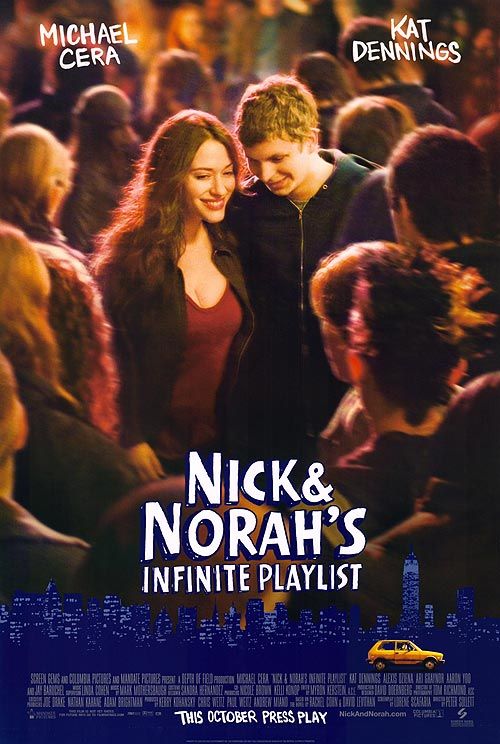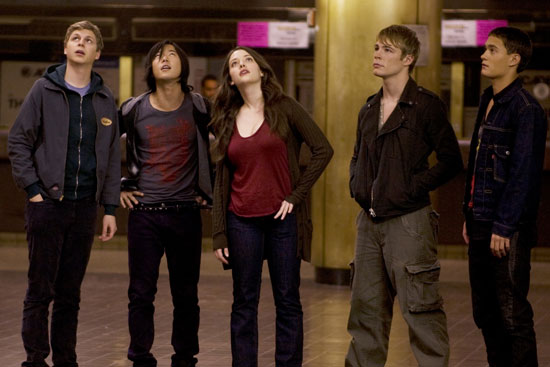Descent: C
Hostel 2: D
Note: The picture above is not the exact photo shown on the DVD cover.
The DVD cover shot intrigued me. A picture of a (seemingly) naked Rosario Dawson, her dark features engulfed by the darkness of her hair, flipped upside down; the photo merging with the title, like she was slowly submerging herself into the cover art; and, finally, the plug from The New York Times comparing Dawson's performance to those of Robert
DeNiro and Hillary Swank in
Taxi Driver and
Boys Don't Cry, respectively. The back of the DVD featured all sorts of hyperbole like "Shocking" (Entertainment Weekly) and "A Masterpiece of Shock Cinema" (
MoviePicture.com). If only
Descent lived up to the sordid expectations I projected upon it. Unfortunately, the film itself is a brutally dull psychological slog that only achieves a visceral reaction during its’ two sequences of violence; until then, it's a straightforward, yet pretentiously abstract, excursion into the psyche of a rape victim that never garners the fist-clenching fury of the two films previously mentioned.
Dawson stars as Maya, a nineteen year old college student at what appears to be a predominantly lily-white college ( I think they mentioned
Claremont). The film starts slowly enough during the winter time, teasing out Dawson's character more through her body language and facial expressions than dialogue. The director and co-writer, Talia
Lugacy, realizes what a fantastic actress she has to work with, and she wisely does more with less in terms of establishing the character's reservedness, but also the power of her femininity. When the Maya meets Jared at a house party, his initial conversation with her hits all the right notes in that it feels forced, authentic, and superficial all at the same time, but it makes for a banal film-making experience. Maya, however, isn't a simple one-note character. One of the nice things about her construction and Dawson's portrayal is that Maya projects a vivid sexuality that makes it easy to see why someone like Jared would find her so attractive, yet she also presents the viewer a vision of an intelligent, prudent woman aware of herself and others. When Jared ends up raping her, a third of the way into the film, the scene is difficult because
Lugacy refuses to cut away for most of its' running time; instead, she keeps the camera in a two-shot close-up, a long take of Jared and Maya making out for the first time that feels ominous, but sensual, until the sexual excitement is replaced by blunt power, as Jared uses his strength to force himself on Maya despite her attempts both verbal and physical to stop him. Jared (played with
meatheaded gusto by Chad Faust) amplifies the abuse when he lets loose a series of racial/ethnic/sexist epithets, which jacks up the
didacticism. Now the film has bluntly called attention to the power dynamics that exist in a white, male dominated world that for centuries has used force to overpower women and, more specifically, the feminine ethnic "other".
This scene, along with the final scene, is the rubber-necking experience I had been expecting, where you want to look away, but find yourself drawn into the degradation. Unfortunately, the middle section, entitled "Spring" is a tedious muddle. An overt, heavy-handed symbolic reference to rebirth, this section is visually presented in Dawson's physical appearance, which now consists of a short bob (more deliberately masculine, but still allowing the feminine sexuality) and her one facial expression (glum, bordering on catatonic). Maya invests herself in her work at a retail store, while falling into an after-hours routine of dance clubs, drugs, sexual exploration, and a strange friendship with Adrian, a muscular, tattooed DJ.
Lugacy even provides Dawson with her own "You
talkin' to me?" scene when Maya stares at herself in a mirror while uttering the confessional "Yeah, you are" repeatedly. Like Travis
Bickle, Maya really is the only one there, a figure who's withdrawn herself into herself and who seeks to disappear in a world of sex and drug use in order to mask her own emotional
stuntedness. And like
Bickle, she will not take it anymore and she seeks release to wash the personal scum in her life off the campus green.
Part of the problem with this middle third is the presentation.
Lugacy favors using long tracking shots, periods of no dialogue, blackouts,
voiceover, and garish red lighting to suggest the hellish underworld that Maya descends into in order to rediscover or reinvent or simply numb herself. Much of it feels hazily realized, intentionally so in order to depict Maya's semi-conscious state of mind. At times, these techniques work to create a feeling of dread and fear. A static shot of Maya dressing/undressing a mannequin at her job does a better job than any in the film at subtly suggesting how woman are treated as window dressing, something to be made-up and redone and presented in such a fashion as to be visually, rather than intellectually, appealing. However, much of Maya's journey is simply a bore and the psychological underpinning never feels fully explored. The film feels made by an academic rather than a dramatist. Her relationship with Adrian never feels fleshed out and her reclamation of sexual power (evident in the section's final scene, where Maya makes out with a woman while getting eaten out by a man) seems strained, rather than earned because the filmmaker hasn't provided strong enough evidence to make this seem plausible.
The final section ("Fall" - again, heavy-handed title card) seems shorter and turns Maya into an avenging angel. I don't want to spoil too much, but the final scene, shot with implication rather than explicitness, is primal in its power. It also subverts the initial rape scene and demonstrates an alternative reality where the (ethnic/racial/sexual/linguistic) abuse that has historically been aimed towards women and minorities is righted old testament style. Much like the climax of
Taxi Driver, this scene confronts viewers. It forces us to take into account our own personal and moral beliefs, and makes us consider whether our own primal desires trump our highfalutin "black and white" belief system when the theoretical becomes reality.
It will be interesting to see more from
Lugacy.
Descent is her first full-length feature, and she has a command of visual/aural relationships used to provoke an atmosphere of a world coming unhinged. I hope her storytelling steps up to become leaner and meaner, more interested in dramatically juicing her stories so they don’t become so narcoleptic. Because when all is said and done,
Descent is ultimately a
grindhouse revenge thriller disguised as feminist post-traumatic rape treatise.
With that being said, the director of
Hostel 2, Eli Roth, could learn a thing or two from Talia
Lugacy. I never meant for the two to be viewed as companion films, but it just so happened I rented them on the same night and watched them back to back. As a matter of fact, I think
Hostel 2 would have been much improved if
Lugacy had left her textbooks at home and directed this trash.
Hostel 2 is a replica of the first film, where a bunch of backpacking college kids end up in Slovakia for good times only to end up kidnapped and sold to the highest bidder invested in a “murder for sale” business known as Elite Hunting. The only difference this time around is the sequel replaces the callous boys of the original with a trio of young women. This is probably Roth’s idea of female empowerment. Anyways, if you have seen the original, you’
ve seen the sequel by default. If you enjoy seeing a naked woman hung upside down while another woman slices her open to bathe in the girl’s blood while seemingly masturbate, this film is for you.
What really struck me is the idea of
Lugacy making this kind of trash. Roth has no intention nor desire to generate the threat of violence or humiliation or intimidation through a strategic manipulation of image and sound; he wants to get to the good stuff and wallow there. The problem with this approach is no real menace, no real fear is generated as the story unfolds-instead, the viewer is subjected to recurrent scenes of disembowelment, cannibalism, and the climactic money shot, a castration shown in full where a cock gets devoured by Dobermans
jonesing for some real meat.
Lugacy could have shot the lights out of this film and provoked some real tension, some real atmospheric dread, and most importantly, some genuine scares. She has a great understanding that less actually can be more, and her instincts would have left
Hostel 2 a more horrific film rather than the tired piece of shit it becomes.
I
didn’t hate
Hostel 2. It’s not repulsive enough to hate. It’s just not scary. The original
Hostel, despite any objections to content, contained some real chills. Now that the cat’s out of the bag concerning the protagonists’ fates, Roth would have been wise to go in the other direction. Less focus on gore (much of which is more comedic than frightening—not deliberately, I believe), more on sustaining a mood. Because it’s not in the knowing, but in the telling, and in
Hostel 2, Roth simply tells us the story in the same exact way. If I’d known this to be the case, I would have rented
Hostel again.





























